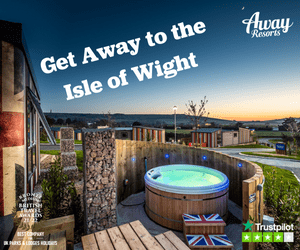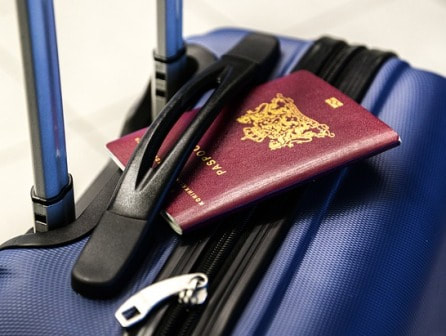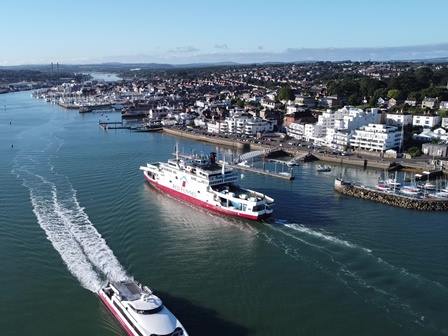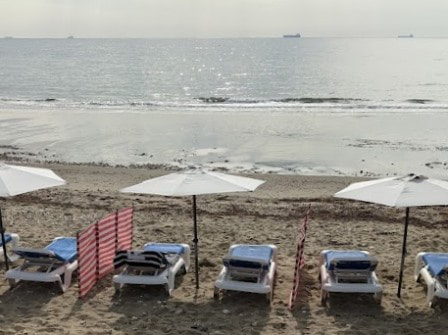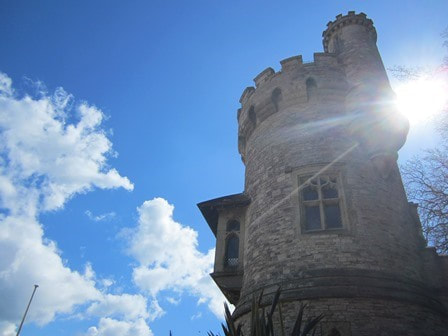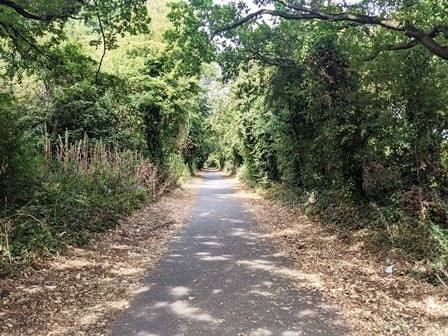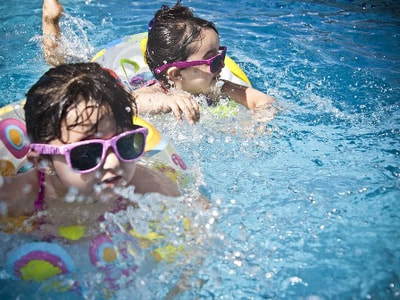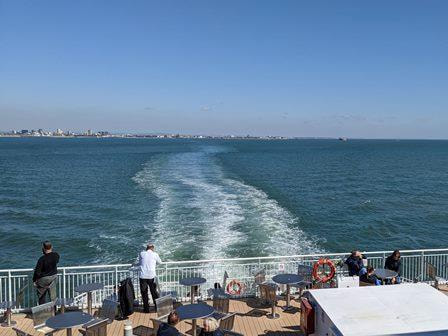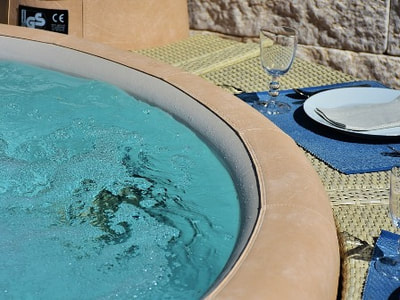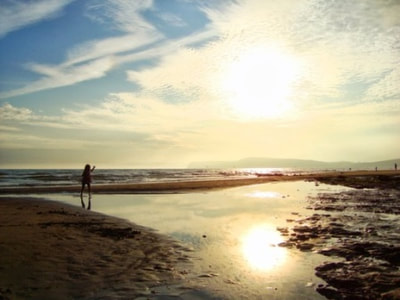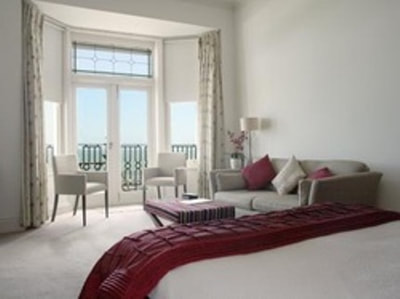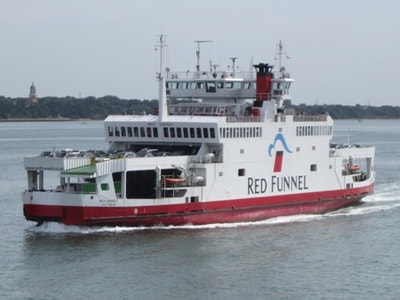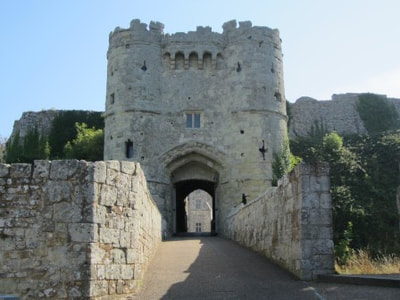This site uses cookies - see our privacy policy. Ads & links in bold may give us a small payment from the seller, at no cost to the buyer. However, this never affects our views - if we like it, we recommend it.
Frequently Asked Questions About Isle Of Wight Holidays (2024 Guide)
Q. How can I get to the Isle of Wight?
A: For advice on how to get to the Isle of Wight, take a look at our Isle of Wight ferry beginners' guide. Car drivers have the option of travelling to Lymington, Portsmouth or Southampton and then catching a ferry which takes about 40 - 60 minutes.
Foot passengers have the option of travelling to Lymington, Portsmouth, Southampton or Southsea for a crossing which takes between 10 minutes and one hour. As a very broad guide, it costs about £50 - £300 to take a car with passengers or about £10 - £40 for a foot passenger depending on factors such as time of year, length of stay, time of day and how regularly you travel.
If you've paid full price for the ferry, something has gone wrong. Plenty of discounts, deals and loopholes are available if you don't mind a bit of faff. See our guide to discount Isle of Wight ferry travel for lots of money saving suggestions and discount codes.
One of the cheapest ways of getting to the Isle of Wight is to get a ferry and accommodation bundle.
Foot passengers have the option of travelling to Lymington, Portsmouth, Southampton or Southsea for a crossing which takes between 10 minutes and one hour. As a very broad guide, it costs about £50 - £300 to take a car with passengers or about £10 - £40 for a foot passenger depending on factors such as time of year, length of stay, time of day and how regularly you travel.
If you've paid full price for the ferry, something has gone wrong. Plenty of discounts, deals and loopholes are available if you don't mind a bit of faff. See our guide to discount Isle of Wight ferry travel for lots of money saving suggestions and discount codes.
One of the cheapest ways of getting to the Isle of Wight is to get a ferry and accommodation bundle.
Q. Will I need a passport to visit the Isle of Wight?
A: Ha ha ha ha ha! Ahem, sorry, I mean no you don't need a passport although obviously you'd need one to get into the UK if you're coming from abroad.
The Isle of Wight is an English county - much like Dorset or Hampshire. It just happens to be surrounded by water.
The exception might be if you came by plane to one of the two small airports, but I've never flown into the Isle of Wight to test it out.
The Isle of Wight is an English county - much like Dorset or Hampshire. It just happens to be surrounded by water.
The exception might be if you came by plane to one of the two small airports, but I've never flown into the Isle of Wight to test it out.
Q. How can I get cheap ferry travel to the Isle of Wight?
A: Well, believe it or not, the Office of Fair Trading actually found that it was comparable in price to other stretches of water in Europe but it's hard to deny that it can be expensive at peak times (I've seen car return fares of £300+ being offered). Having said that, I've also got a return with a car full of people that worked out at £10 per person.
Hopefully, our guide to cheap Isle of Wight ferry travel will help. There are things such as Wightlink's Tesco Clubcard deal that can make it much cheaper. There are also deals for semi-regular travellers such as Wightlink's Multilink deal.
It's also worth looking at the official offers pages for the three ferry companies.
Hopefully, our guide to cheap Isle of Wight ferry travel will help. There are things such as Wightlink's Tesco Clubcard deal that can make it much cheaper. There are also deals for semi-regular travellers such as Wightlink's Multilink deal.
It's also worth looking at the official offers pages for the three ferry companies.
Q. So why hasn't anyone built a bridge to the Isle of Wight?
A: Ah, well, that's a bit of a divisive one. Some Islanders think a bridge or tunnel would be great and would make it cheaper to get to the mainland. Others think that the Island's roads couldn't cope with the influx of cars pouring over from the South East on a sunny day and that it would ruin the relaxed pace of life and beautiful landscape. The BBC wrote a piece on the possibility of an Isle of Wight bridge in 2013. A tunnel was talked about in the 1990s.
For at least the next 100 years or so I would recommend our guide to cheap Isle of Wight ferry travel, which has things like promotional and discount codes, tip, tricks and loopholes for Wightlink and Red Funnel.
If you want to play a fun game, take a look at any news article about the Isle of Wight and see how far into the comments section you get before someone makes a remark about a fixed link. It's a hoot.
For at least the next 100 years or so I would recommend our guide to cheap Isle of Wight ferry travel, which has things like promotional and discount codes, tip, tricks and loopholes for Wightlink and Red Funnel.
If you want to play a fun game, take a look at any news article about the Isle of Wight and see how far into the comments section you get before someone makes a remark about a fixed link. It's a hoot.
Q. How many people live on the Isle of Wight?
A: All of them! Anyway...the official population is about 140,400 but the Isle of Wight is visited by around 2.5 million holidaymakers each year meaning that the number goes much higher during the summer months. That population figure is from 2021.
Q. Which town should I stay in on the Isle of Wight?
A. It depends on what you are after. Peace and quiet? An ice cream and a game of minigolf on the seafront? A romantic break? Beautiful coastal walks?
Take a look at our guide to Which Isle of Wight should I stay in?
In summary, for young children or nostalgic adults I would recommend Shanklin if you like amusement arcades, minigolf and deckchairs. If you are looking for somewhere peaceful and romantic for quiet walks then the South Wight or West Wight are perfect (Ventnor, St Lawrence, Yarmouth, Brighstone, Freshwater Bay).
If you would rather be a bit closer to civilisation and nightlife then Newport/Cowes/Ryde are your best bet. If you want somewhere accessible but pretty then the East Wight (Bembridge, Seaview) is worth considering.
There are lots of lodge parks, caravan parks and posh hotels to choose from, as well as camping, glamping and hot tub holidays on the Isle of Wight. If you want a self-catering cottage, then try Hoseasons or HolidayCottages.co.uk.
Personally, I love having a sea view on holiday - so we've written guides to holiday cottages with sea views and hotels with sea views.
Take a look at our guide to Which Isle of Wight should I stay in?
In summary, for young children or nostalgic adults I would recommend Shanklin if you like amusement arcades, minigolf and deckchairs. If you are looking for somewhere peaceful and romantic for quiet walks then the South Wight or West Wight are perfect (Ventnor, St Lawrence, Yarmouth, Brighstone, Freshwater Bay).
If you would rather be a bit closer to civilisation and nightlife then Newport/Cowes/Ryde are your best bet. If you want somewhere accessible but pretty then the East Wight (Bembridge, Seaview) is worth considering.
There are lots of lodge parks, caravan parks and posh hotels to choose from, as well as camping, glamping and hot tub holidays on the Isle of Wight. If you want a self-catering cottage, then try Hoseasons or HolidayCottages.co.uk.
Personally, I love having a sea view on holiday - so we've written guides to holiday cottages with sea views and hotels with sea views.
Q. Can you get around the Isle of Wight without a car?
The short answer is yes, you can get around the Isle of Wight without a car.
However, I would say it's a lot easier if you stay in the East Wight (Ryde, Sandown, Shanklin), or possibly in Newport. The East Wight has a trainline which connects Ryde Pierhead (one of the ferry ports) with Ryde Esplanade, Sandown and Shanklin. They're all busy seaside resorts which are good if you like sandy beaches, amusement arcades, playgrounds and ice cream on a sunny day. Ryde has a bus station which connects with much of the Isle of Wight.
Meanwhile, Newport is a fairly ordinary market town in the middle of the Isle of Wight but it has the biggest bus station so you can get anywhere quite quickly. In the car, you can get anywhere from Newport in about half an hour but on the bus it will be longer.
I would say that you would find it more difficult to explore the Isle of Wight without a car if you stay in the South Wight (Ventnor, St Lawrence) or the West Wight (Yarmouth, Brighstone, Freshwater). That side of the Island is quieter and (in my view) prettier with some unspoilt beaches and coastline but there are no trains and fewer buses. For example, if you wanted to travel from Freshwater Bay in the West Wight to Ryde in the East Wight it would take you 40 minutes in a car or about 90 minutes on a bus.
Regarding cost, I've found that the buses are good value if you get a week's pass and travel as a group. They are more expensive if you buy individual journeys. See our public transport guide for more waffle on this topic.
Car drivers might like to see our guide to the perfect Isle of Wight road trip called the Wighty 90.
However, I would say it's a lot easier if you stay in the East Wight (Ryde, Sandown, Shanklin), or possibly in Newport. The East Wight has a trainline which connects Ryde Pierhead (one of the ferry ports) with Ryde Esplanade, Sandown and Shanklin. They're all busy seaside resorts which are good if you like sandy beaches, amusement arcades, playgrounds and ice cream on a sunny day. Ryde has a bus station which connects with much of the Isle of Wight.
Meanwhile, Newport is a fairly ordinary market town in the middle of the Isle of Wight but it has the biggest bus station so you can get anywhere quite quickly. In the car, you can get anywhere from Newport in about half an hour but on the bus it will be longer.
I would say that you would find it more difficult to explore the Isle of Wight without a car if you stay in the South Wight (Ventnor, St Lawrence) or the West Wight (Yarmouth, Brighstone, Freshwater). That side of the Island is quieter and (in my view) prettier with some unspoilt beaches and coastline but there are no trains and fewer buses. For example, if you wanted to travel from Freshwater Bay in the West Wight to Ryde in the East Wight it would take you 40 minutes in a car or about 90 minutes on a bus.
Regarding cost, I've found that the buses are good value if you get a week's pass and travel as a group. They are more expensive if you buy individual journeys. See our public transport guide for more waffle on this topic.
Car drivers might like to see our guide to the perfect Isle of Wight road trip called the Wighty 90.
Open top buses
Another thing to consider is that during the warmer months there are open top buses that provide a great way to see the Island on a sunny day. From the top deck you get fantastic views on some routes. There's also a pre-recorded commentary. On a cold day it is akin to being locked in a freezer, so I would sit downstairs or bring a hot water bottle.
Day tripping
If you are planning a day trip to the Isle of Wight, then the advice about cars v public transport varies depending on which ferry port you are leaving from. Read our guides to day trips from Southampton, Lymington and Portsmouth for an excessively detailed guide, along with some advice of what to do. We've even got a guide just for people coming from London - whatever next!
cycling
Finally, if you are a keen bean bottom wiggling cyclist, then I would say that holidaying without a car is achievable. Several of the best car-free sections of cycle path have been attached together to form the Red Squirrel Trail. There are some sections on quiet roads to link up the off-road sections.
Distances between towns are not vast, although some roads can be a bit busy in summer. If you were to stay in Newport then it would be about an hour's bike ride to several nice beaches, assuming you took the most direct route.
See our guide to Isle of Wight cycling holidays.
Distances between towns are not vast, although some roads can be a bit busy in summer. If you were to stay in Newport then it would be about an hour's bike ride to several nice beaches, assuming you took the most direct route.
See our guide to Isle of Wight cycling holidays.
Q. Does the Isle of Wight have an airport?
A. Yes, it has two...but it's pretty unlikely you will arrive by plane as they are more 'airfields' than 'airports'. They are in Sandown and Bembridge and both are for light aircraft. According to UK General Aviation, Sandown offers 'the best bacon rolls in the world of aviation', has a grass runway and only charges £10 for a plane to land. Surely, it's only a matter of time before Ryanair catch on and changes the airport's name to 'London Sandown Airport'?
The nearest large airport is Southampton, which has flights from various European and UK cities such as Paris, Amsterdam and Edinburgh. Bournemouth is the next nearest airport.
The nearest large airport is Southampton, which has flights from various European and UK cities such as Paris, Amsterdam and Edinburgh. Bournemouth is the next nearest airport.
Q. Which are the cleanest Isle of Wight beaches?
A. The short answer is that it varies from day to day as there are a number of sewage outlets around the coastline. My understanding is that they are used when it has been raining heavily, so seawater is generally cleaner in summer.
This isn't just an Isle of Wight problem so don't let it put you off visiting. Sewage is legally dumped in the waters around the UK (and sometimes illegally dumped too).
My advice is to use the Safer Seas Service, which is a free map and app provided by a charity called Surfers Against Sewage. It gives regularly updated advice on water quality at beaches on the Isle of Wight.
For what it's worth, I'll mention that Sandown was awarded a Blue Flag for clean water in 2022. Meanwhile, St Helens, Seagrove and Springvale (all in the East Wight) have Seaside Awards which 'ensures visitors are guaranteed to find a clean, safe, attractive and well-managed coastal stretch'.
See our interactive beach map (or the simpler mobile version) for more information and pictures of Isle of Wight beaches. We've also got a guide to 'which is the best beach for...'
This isn't just an Isle of Wight problem so don't let it put you off visiting. Sewage is legally dumped in the waters around the UK (and sometimes illegally dumped too).
My advice is to use the Safer Seas Service, which is a free map and app provided by a charity called Surfers Against Sewage. It gives regularly updated advice on water quality at beaches on the Isle of Wight.
For what it's worth, I'll mention that Sandown was awarded a Blue Flag for clean water in 2022. Meanwhile, St Helens, Seagrove and Springvale (all in the East Wight) have Seaside Awards which 'ensures visitors are guaranteed to find a clean, safe, attractive and well-managed coastal stretch'.
See our interactive beach map (or the simpler mobile version) for more information and pictures of Isle of Wight beaches. We've also got a guide to 'which is the best beach for...'
Q. What are people from the Isle of Wight called?
A: Generally, people from the Isle of Wight are called 'caulkheads' or 'Islanders' or according to Wikipedia 'Vectensians or Vectians'. The rule seems to be that you have to be a third generation Islander to call yourself a 'caulkhead'. There are various tales about the etymology of 'caulkheads', but most theories suggest it is either to do with caulking boats or floating in water.
Mainlanders who have moved to the Island are usually called Overners, whilst I've heard tourists referred to as Grockles before.
Common Isle of Wight lexicon includes Nammit (food), Gurt (great/large) and Somewhen (a combination of somewhere and sometime). If you want to fit in, try saying "eh nipper, fancy a gurt plate of nammit somewhen?"
Mainlanders who have moved to the Island are usually called Overners, whilst I've heard tourists referred to as Grockles before.
Common Isle of Wight lexicon includes Nammit (food), Gurt (great/large) and Somewhen (a combination of somewhere and sometime). If you want to fit in, try saying "eh nipper, fancy a gurt plate of nammit somewhen?"
Q. Is it true that the population of the world could fit on the Isle of Wight?
A: No, but it was probably true up until around 1981, according to my back-of-an-envelope calculations.
Back in 1980, there were about 4.454 billion people on earth (source: Infoplease). The Isle of Wight is about 384 square kilometres, which is 384 000 000 square metres. For simplicity, I've ignored the fact that the Isle of Wight shrunk when most of Blackgang Chine fell into the sea in the 1990s.
So, the Isle of Wight could have hosted a party for the entire planet if you squeezed 11.5 people into each metre square.
We tried this out at a family gathering one Christmas and managed to fit 12 people into a metre square. It was a cosy experience, particularly after a turkey dinner. We couldn't have included a 13th person.
Back in 1980, there were about 4.454 billion people on earth (source: Infoplease). The Isle of Wight is about 384 square kilometres, which is 384 000 000 square metres. For simplicity, I've ignored the fact that the Isle of Wight shrunk when most of Blackgang Chine fell into the sea in the 1990s.
So, the Isle of Wight could have hosted a party for the entire planet if you squeezed 11.5 people into each metre square.
We tried this out at a family gathering one Christmas and managed to fit 12 people into a metre square. It was a cosy experience, particularly after a turkey dinner. We couldn't have included a 13th person.
Nowadays, the earth's population is much greater. There are eight billion people on earth (source: Wikipedia, 2023) which would require almost 21 people to fit into each square metre of the Isle of Wight. There's just no way that you could do it without standing on each other's shoulders.
My best guess is that it ceased to be possible to fit the entire population of the world on the Isle of Wight in around 1981.
My best guess is that it ceased to be possible to fit the entire population of the world on the Isle of Wight in around 1981.
Q. Is it correct to SAY 'In the Isle of Wight' or 'On the Isle of Wight'?
A: To be honest, no-one has ever actually asked me this question, but it's been irritating me for some time.
I've always been convinced that the correct preposition is 'on the Isle of Wight', as in 'I had a lovely holiday on the Isle of Wight'. From my survey of three people, I'd say that 'on' is what Isle of Wight residents say. Generally, you'll see 'in the Isle of Wight' written when the text has been produced automatically, such as searching on accommodation booking websites (for example, 'search for self-catering in Isle of Wight'). You will also hear it in the Beatles' song, When I'm 64:
"Every summer we can rent a cottage
In the Isle of Wight, if it's not too dear"
Grammatically speaking, 'in' tends to be applied to permanent land masses (in England, in Southampton etc.), whereas you would use 'on' for the surface of an object (on the table, on the boat etc.).
There's a good argument that 'in' is grammatically accurate, as the Isle of Wight isn't floating.
Sorry if you just drifted off whilst reading that last section but the short answer is that it's open to debate.
I've always been convinced that the correct preposition is 'on the Isle of Wight', as in 'I had a lovely holiday on the Isle of Wight'. From my survey of three people, I'd say that 'on' is what Isle of Wight residents say. Generally, you'll see 'in the Isle of Wight' written when the text has been produced automatically, such as searching on accommodation booking websites (for example, 'search for self-catering in Isle of Wight'). You will also hear it in the Beatles' song, When I'm 64:
"Every summer we can rent a cottage
In the Isle of Wight, if it's not too dear"
Grammatically speaking, 'in' tends to be applied to permanent land masses (in England, in Southampton etc.), whereas you would use 'on' for the surface of an object (on the table, on the boat etc.).
There's a good argument that 'in' is grammatically accurate, as the Isle of Wight isn't floating.
Sorry if you just drifted off whilst reading that last section but the short answer is that it's open to debate.
Q. What is the Isle of Wight postcode?
My Dad once told me that if you post a letter to your neighbour on the Isle of Wight, it will go across on the ferry to be sorted and then catch the ferry back. I'm still not sure if he was winding me up, but the Isle of Wight postcode is certainly shared with Portsmouth.
So, the Isle of Wight postcode is PO30 1UD for example (that's Isle of Wight Council's County Hall). The prefixes are PO30, PO31, PO32, PO33, PO34, PO35, PO36, PO37, PO38, PO39, PO40 and shockingly - PO41.
I know that's not terribly interesting, but you did search for it, so you've only got yourself to blame.
So, the Isle of Wight postcode is PO30 1UD for example (that's Isle of Wight Council's County Hall). The prefixes are PO30, PO31, PO32, PO33, PO34, PO35, PO36, PO37, PO38, PO39, PO40 and shockingly - PO41.
I know that's not terribly interesting, but you did search for it, so you've only got yourself to blame.
